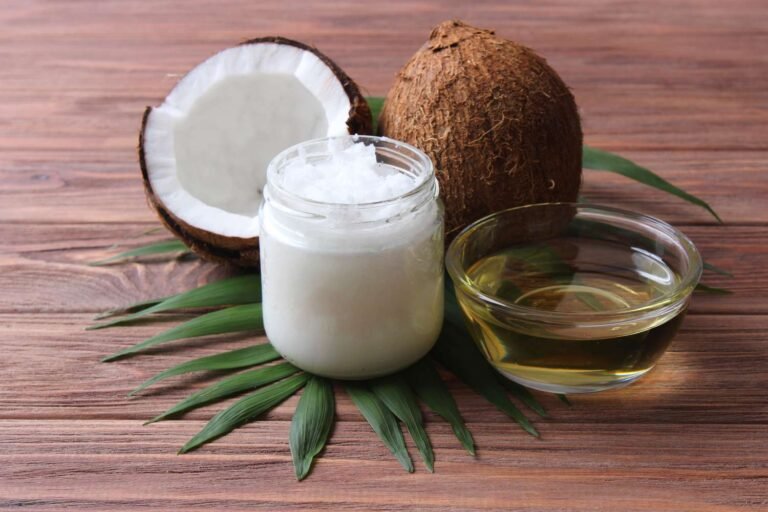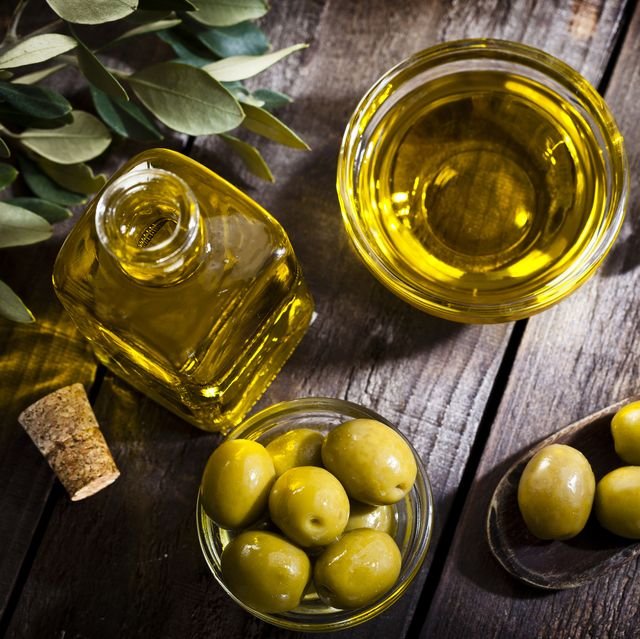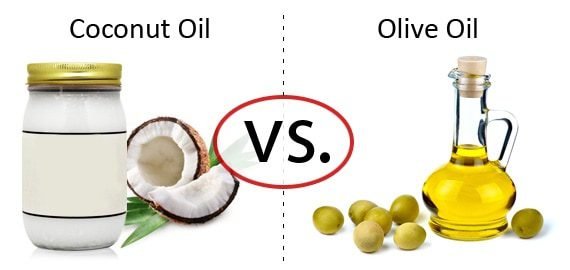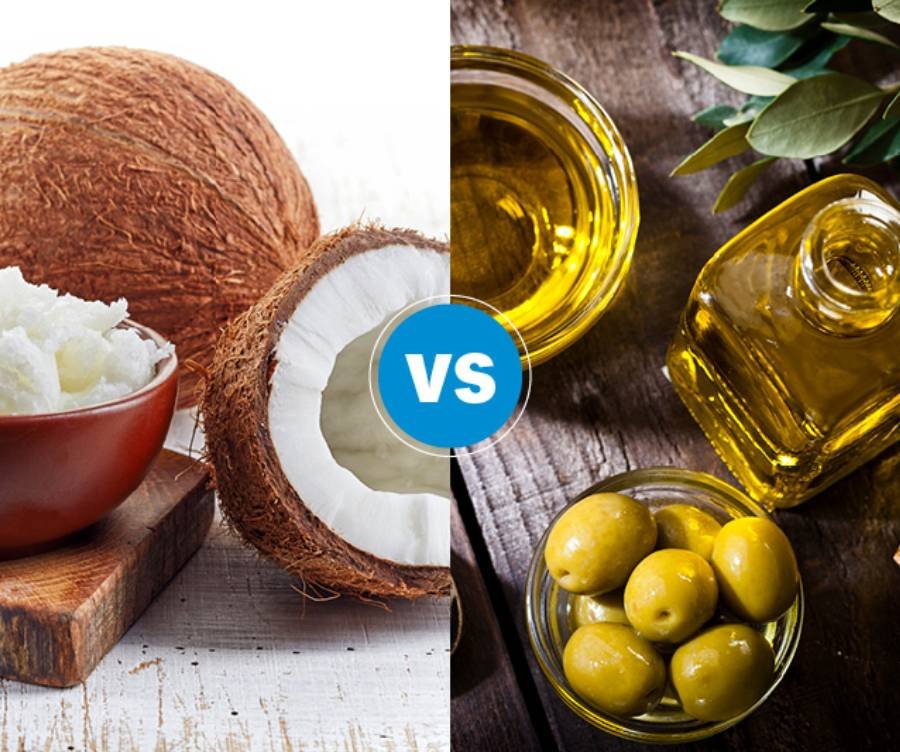Coconut Oil VS Olive Oil: Which one is better?
When it comes to oils, coconut oil and olive oil are two popular choices with their own set of benefits. Whether you’re looking to enhance your skincare routine, improve your hair health, or elevate your cooking, understanding the qualities of each oil can help you make an informed decision.
In this article, we will compare coconut oil and olive oil to determine which one is better for various purposes such as skincare, haircare, and beauty. By exploring their benefits and properties, you can find the oil that best suits your needs.
Key Takeaways - Coconut Oil VS Olive Oil:
- Coconut oil and olive oil have unique advantages and are widely used for different purposes.
- Coconut oil offers benefits for skin and hair
- Olive oil is known for its moisturizing properties and antioxidant content.
- Consider the nutritional profiles and environmental impact of coconut oil and olive oil when making your choice.
Benefits of Coconut Oil for Skin and Hair

Coconut oil has gained immense popularity in recent years, and for good reason. It offers a myriad of benefits for both your skin and hair, making it a must-have in your beauty routine.
Skin Benefits Of Coconut Oil
When it comes to skincare, coconut oil is a game-changer. Its moisturizing properties help to nourish and hydrate the skin, leaving it soft and supple. The oil acts as a barrier, preventing moisture loss and protecting the skin from environmental damage.
Additionally, coconut oil has natural anti-aging properties. It contains antioxidants that can help reduce the appearance of fine lines and wrinkles, promoting a more youthful complexion. Regular use of coconut oil can also help improve skin elasticity and firmness, giving you a radiant and rejuvenated look.
Hair Benefits Of Coconut Oil
Coconut oil is equally beneficial for your hair, offering a range of advantages for its health and appearance. It penetrates deep into the hair shaft, providing intense moisturization and repairing damage from within.
Regular use of coconut oil can help prevent protein loss, strengthening the hair and reducing breakage. It also helps to seal the hair cuticles, making the strands smoother and reducing frizz. The oil’s nourishing properties can contribute to enhanced shine, softness, and manageability, giving you luscious, healthy-looking hair.
| Benefits of Coconut Oil for Skin | Benefits of Coconut Oil for Hair |
|---|---|
| Moisturizes and hydrates the skin | Provides intense moisturization |
| Protects against environmental damage | Prevents protein loss |
| Reduces the appearance of fine lines and wrinkles | Strengthens hair and reduces breakage |
| Improves skin elasticity and firmness | Enhances shine and reduces frizz |
As you can see, coconut oil offers numerous benefits for both the skin and hair. Whether you’re looking to achieve a glowing complexion or transform your hair into silky smooth locks, incorporating coconut oil into your beauty routine can help you achieve your desired results.
Benefits of Olive Oil for Skin and Hair

Olive oil is a versatile oil that offers numerous benefits for both skin and hair. Its moisturizing properties make it an excellent addition to your skincare routine, while its antioxidant content helps protect against damage caused by free radicals. Let’s explore the specific advantages of olive oil for your skin and hair:
1. Moisturizes and Nourishes Skin
Olive oil is rich in healthy fats and vitamins, making it an effective moisturizer for dry skin. It helps lock in moisture and leaves your skin feeling soft and supple. Additionally, the presence of antioxidants in olive oil helps combat skin inflammation and irritation, promoting a healthy complexion.
2. Anti-Aging Benefits
The antioxidants found in olive oil can help reduce the appearance of fine lines and wrinkles, making it a natural anti-aging ingredient. Regularly applying olive oil to your skin can improve skin elasticity and firmness, giving you a more youthful look.
3. Promotes Healthy Hair
Olive oil is widely used in haircare due to its ability to nourish and strengthen the hair strands. It helps moisturize the scalp, reducing dryness and flakiness. Olive oil can also improve hair manageability, add shine, and prevent breakage and split ends.
4. Conditions and Soothes the Scalp
If you have a dry or itchy scalp, using olive oil can provide relief. The moisturizing properties of olive oil help hydrate the scalp and alleviate discomfort. It can also help to reduce dandruff and irritation, promoting a healthier scalp environment.
5. Protects Against Environmental Damage
The antioxidants present in olive oil can help protect your skin and hair from environmental damage caused by UV radiation and pollutants. Regular use of olive oil can create a protective barrier, reducing the harmful effects of the sun and other external factors.
6. Versatile and Natural
Olive oil is a natural ingredient that is readily available and affordable. It can be used as a standalone product, or as an ingredient in DIY skincare and haircare recipes. Its versatility makes it a popular choice for those looking for a natural and effective solution for their skin and hair concerns.
Overall, olive oil offers a range of benefits for both skin and hair. Whether you’re looking for a moisturizer, anti-aging treatment, or a natural conditioner, olive oil can be a valuable addition to your beauty routine.
| Benefits of Olive Oil for Skin and Hair | Details |
|---|---|
| Moisturizes and Nourishes Skin | Rich in healthy fats and vitamins, olive oil moisturizes and softens the skin, while antioxidants help combat inflammation. |
| Anti-Aging Benefits | Olive oil’s antioxidants reduce the appearance of fine lines and wrinkles, improving skin elasticity and firmness. |
| Promotes Healthy Hair | Olive oil nourishes and strengthens hair, moisturizes the scalp, improves manageability, and prevents breakage and split ends. |
| Conditions and Soothes the Scalp | Olive oil hydrates the scalp, reduces dryness, soothes irritation, and helps combat dandruff. |
| Protects Against Environmental Damage | Acting as a protective barrier, olive oil shields skin and hair from UV radiation and pollutants. |
| Versatile and Natural | Affordable and readily available, olive oil can be used as a standalone product or in DIY beauty recipes. |
Comparison of Nutritional Profiles
In this section, we will compare the nutritional profiles of coconut oil and olive oil to help you make an informed decision about which oil to incorporate into your eating habits. We will examine their fat content, vitamin and mineral content, and how they can contribute to a balanced diet.
1. Fat Content
Both coconut oil and olive oil are sources of fat, but they differ in terms of their composition. Coconut oil is primarily composed of saturated fat, while olive oil is mostly monounsaturated fat. Here is a breakdown of the fat content in a typical serving of each oil:
| Oil | Saturated Fat | Monounsaturated Fat | Polyunsaturated Fat |
|---|---|---|---|
| Coconut Oil | 11 g | 0.2 g | 0.1 g |
| Olive Oil | 1.9 g | 9.9 g | 1.4 g |
2. Vitamin and Mineral Content
Coconut oil and olive oil also differ in terms of their vitamin and mineral content. While they do not contain significant amounts of vitamins or minerals, olive oil tends to have slightly higher levels of vitamin E and vitamin K compared to coconut oil. Here is an overview of the vitamin and mineral content in a typical serving of each oil:
| Oil | Vitamin E | Vitamin K | Other |
|---|---|---|---|
| Coconut Oil | 0.1 mg | 0 mcg | N/A |
| Olive Oil | 1.9 mg | 8.1 mcg | N/A |
It’s important to note that the nutritional content may vary depending on the brand and the extraction process of the oils. Additionally, coconut oil and olive oil should be consumed in moderation as part of a balanced diet.
2. Vitamin and Mineral Content
Coconut oil and olive oil also differ in terms of their vitamin and mineral content. While they do not contain significant amounts of vitamins or minerals, olive oil tends to have slightly higher levels of vitamin E and vitamin K compared to coconut oil. Here is an overview of the vitamin and mineral content in a typical serving of each oil:
| Oil | Vitamin E | Vitamin K | Other |
|---|---|---|---|
| Coconut Oil | 0.1 mg | 0 mcg | N/A |
| Olive Oil | 1.9 mg | 8.1 mcg | N/A |
It’s important to note that the nutritional content may vary depending on the brand and the extraction process of the oils. Additionally, coconut oil and olive oil should be consumed in moderation as part of a balanced diet.
Environmental Impact of Coconut Oil vs Olive Oil

The environmental impact of different oils should be a significant consideration when choosing the right option for your needs. In this section, we will explore the sustainability of coconut oil and olive oil production, their impact on ecosystems, and the associated carbon footprint.
Sustainability of Production
Coconut oil is derived from the fruit of the coconut palm tree, which thrives in tropical regions. However, the production of coconut oil can have varying environmental implications depending on the farming practices employed. Traditional methods, such as small-scale farming and hand-pressed extraction processes, generally have a lower environmental impact compared to large-scale, industrial production.
On the other hand, olive oil is derived from the olive tree, which is native to the Mediterranean region. Olive trees are well-suited to the climate and require less water compared to other crops. Furthermore, olive oil production often follows traditional and sustainable agricultural practices, minimizing negative environmental impact.
Carbon Footprint
In terms of carbon footprint, coconut oil production is associated with relatively low emissions due to its smaller-scale production and localized supply chains. However, the transport of coconuts and coconut oil to different regions can contribute to carbon emissions.
Olive oil production generally has a lower carbon footprint due to the efficient use of resources and the proximity of olive farms to oil processing facilities. Additionally, the use of by-products from olive oil production, such as olive pomace, can further reduce waste and environmental impact.
| Environmental Impact | Coconut Oil | Olive Oil |
|---|---|---|
| Sustainability of Production | Varies depending on farming practices | Generally sustainable |
| Impact on Ecosystems | Can lead to deforestation and loss of biodiversity in large-scale plantations | Supports biodiversity and wildlife in mixed-cropping systems |
| Carbon Footprint | Relatively low emissions, but transportation contributes to carbon footprint | Lower emissions due to efficient resource use and proximity to processing facilities |
FAQ
Once the peeling process is complete, it’s essential to follow a proper post-peeling skincare routine. This will help your skin recover and maintain its health. Now that you know how to use the ordinary peeling solution, Here are some tips and recommendations to incorporate into your routine:
1. Moisturize
After using The Ordinary Peeling Solution, your skin may feel dry or sensitive. It’s important to moisturize regularly to replenish hydration and promote healing. Look for a gentle moisturizer suitable for your skin type and apply it twice a day, in the morning and evening.
2. Sun Protection
Protecting your skin from the sun’s harmful rays is crucial, especially after using a peeling solution. Apply a broad-spectrum sunscreen with an SPF of 30 or higher before stepping outdoors. Reapply every two hours, especially if you’re spending prolonged periods in the sun.
3. Gentle Cleansing
Avoid using harsh cleansers or exfoliants on your skin for at least a week after using The Ordinary Peeling Solution. Opt for a gentle cleanser to keep your skin clean without causing any irritation. Remember to cleanse your face twice a day, in the morning and evening.
4. Avoid Active Ingredients
During the post-peeling phase, it’s best to avoid using any other active skincare ingredients, such as retinol or acids. Give your skin some time to recover and regain its balance before reintroducing these products into your routine.
5. Hydrating Face Masks
Incorporating hydrating face masks into your skincare routine can provide an extra boost of nourishment to your skin. Choose masks that are specifically formulated to hydrate and soothe the skin. Use them once or twice a week to give your skin some extra TLC.
6. Gentle Physical Exfoliation
After the peeling process, your skin may still have some dead skin cells that need to be gently sloughed away. Consider using a gentle physical exfoliant, such as a soft face cloth or a gentle scrub, once a week to polish your skin and reveal a smoother complexion.
By following this post-peeling skincare routine, you can help your skin recover and maintain its health after using The Ordinary Peeling Solution. Remember to always listen to your skin and make adjustments if necessary. If you have any concerns, consult with a dermatologist for personalized advice and guidance.
FAQ Coconut Oil VS Olive Oil
Is coconut oil better than olive oil for skin and hair?
Both coconut oil and olive oil offer benefits for skin and hair, but their properties differ. Coconut oil is known for its moisturizing properties and can help hydrate the skin and hair. Olive oil, on the other hand, contains antioxidants that can nourish and protect the skin and hair. The choice depends on your specific needs and preferences.
What are the benefits of using olive oil for cooking?
Olive oil is a popular choice for cooking, especially in Mediterranean cuisine. It has a distinct flavor that can enhance the taste of dishes. Olive oil also contains healthy monounsaturated fats and antioxidants, which can have potential health benefits when used in moderation.
Which oil has a higher nutritional content, coconut oil, or olive oil?
When it comes to the nutritional profile, olive oil is generally considered healthier than coconut oil. Olive oil is rich in monounsaturated fats, which can help improve heart health. Coconut oil, on the other hand, is high in saturated fats. It is essential to consume oils in moderation and consider your overall dietary needs.
What is the environmental impact of coconut oil and olive oil production?
Both coconut oil and olive oil production have environmental implications. Coconut oil production can contribute to deforestation and habitat destruction in certain regions. Olive oil production, while generally more sustainable, can also have an impact on water usage and soil degradation. It is important to consider the environmental factors when choosing between the two oils.
Which oil should I choose between coconut oil and olive oil?
The choice between coconut oil and olive oil depends on your specific needs and preferences. Both oils offer unique benefits for skincare, haircare, and cooking. Consider your desired outcomes, nutritional preferences, and environmental concerns when making your decision.






















